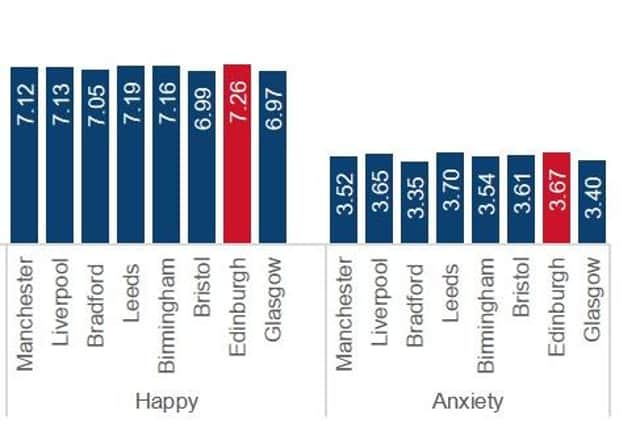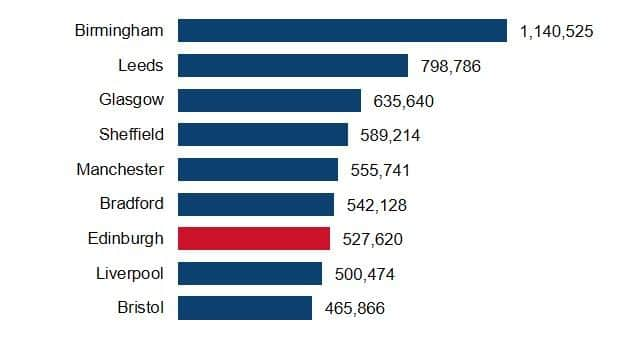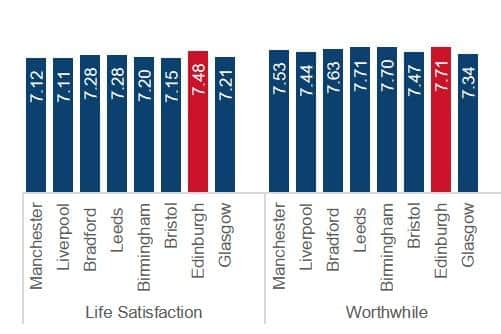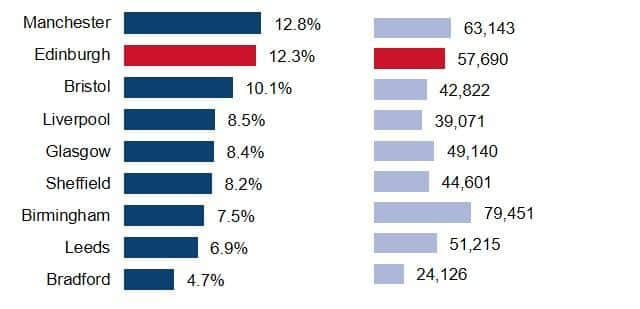Edinburgh's population soars and residents are among the happiest in the UK, according to new statistics report


Let us know what you think and join the conversation at the bottom of this article.
And the Capital's residents are some of the most content in the UK, according to the city council's annual Edinburgh by Numbers statistical report.
It shows the city's population grew by 12.3 per cent in the ten years to 2020 – from an estimated 469,930 to an estimated 527,620 – while the population of Scotland as a whole increased by 3.9 per cent.


Advertisement
Hide AdAdvertisement
Hide AdThat was a much bigger population boom for the Capital than it experienced in the previous two decades, which saw rises of 2.8 per cent from 1990 to 2000 and 4.8 per cent from 2000 to 2010.
And Edinburgh's increase was also bigger than most other major UK cities outside London. Only Manchester had a higher population growth rate at 12.8 per cent.
Council leader Adam McVey said the rapidly rising population highlighted the need for the city to invest in transport and housing and other services.
The population rise is mainly driven by migration into the Capital. The figures show that the net effect of births and deaths on Edinburgh’s population change from 2010 to 2020 was 10,150 while the net effect of migration was nearly five times higher at 49,980.


Advertisement
Hide AdAdvertisement
Hide AdEdinburgh’s net birth and death rate keeps diminishing, falling from a net increase of 960 in 2014-15 to a net reduction of 240 in 2019-20.
The level of overseas migration to Edinburgh fell in 2019-20 to 4,250, its lowest number since 2013-14 and continuing a decreasing trend that was only broken by an increase to 6,710 in year 2018-19.
But the overall population growth to 2020 was almost evenly distributed among age groups, with the child population increasing by 11.1 per cent, the working population by 11.6 per cent and over-65s by 17 per cent. That's in marked contrast to the changes in Scotland as a whole where the child population fell by 0.1 per cent, the working age population rose by just 0.9 per cent and the over-65s increased by nearly 20 per cent.


And Edinburgh’s population is projected to carry on growing, reaching an estimated 586,566 by 2043.
Advertisement
Hide AdAdvertisement
Hide AdMeanwhile, Edinburgh scored highly when it came to personal wellbeing, notching up marks of 7.48 on a scale of one to ten for life satisfaction, 7.26 for happiness and 7.71 for feelings of worth. These were all down from pre-pandemic figures, but top of a league of eight major UK cities including Manchester, Birmingham, Bristol and Glasgow.
However anxiety rose, scoring 3.67 one a scale of one to ten compared with 2.99 pre-pandemic. Only Leeds had a higher rate of anxiety at 3.7.
Councillor McVey said: “Considering most of these numbers cover the pandemic they paint a picture of an extremely resilient and positive city. We’re one of the happiest cities in the country and our economy, which has endured so much, remains strong.
“Edinburgh is still growing at a rate of three times the national average, highlighting the need to continue to invest in public transport and more affordable housing.
Advertisement
Hide AdAdvertisement
Hide Ad"Our residential population has increased by more than ten per cent in a decade. We need to manage this level of growth, both in terms of the impact on our frontline services like schools, housing and transport, and the impact on our environment.
“While we’re at the forefront of tackling these changes, the magnitude of the challenge ahead of us means we need to maximise efforts to plan for the future.
"That’s one of the reasons the £1 billion council budget we set aims to drive forward our net-zero ambitions, tackle the cost of living crisis head on and spend millions on the future health of our communities. The investment we’re making now will prove vital as we prepare for what will be a period rapid growth and regeneration.”#
Depute council leader Cammy Day said: “A sense of optimism shines through the latest Edinburgh By Numbers and there is evidence of the resilience we’ve seen our residents and City display over the last couple of years. It’s heartening that of the people polled, most said they remain satisfied with life in the Capital and all of the work we’re doing to support businesses through Covid and create a fairer and more sustainable economy will also help the city.”
Advertisement
Hide AdAdvertisement
Hide AdThe report also looked at property and found Edinburgh at the top of a league table of eight major UK cities outside London for house prices.
The average house price in Edinburgh in September 2021 was £321,166, just ahead of Bristol on £312,195, but well above third-placed Leeds on £211,437.
A breakdown of Edinburgh’s house prices by type of property showed the average detached home was sold for £716,419 in September 2021, the average semi-detached for £445,230, the average terraced house for £359,853 and the average flat for £244,555.
The average property price in Edinburgh had increased by a considerable 14.5 per cent over the year to September 2021, a faster increasing trend than seen the previous year, but Liverpool and Glasgow saw bigger increases at 15.4 and 15.1 per cent.
Advertisement
Hide AdAdvertisement
Hide AdNew-build house completions in Edinburgh in the five years 2016-20 totaled 12,126 compared with 7,076 in 2011-15, 7,920 in 2006-10 and 10,555 in 2001-05.
A message from the Editor:
Thank you for reading this article. We're more reliant on your support than ever as the shift in consumer habits brought about by coronavirus impacts our advertisers.
If you haven't already, please consider supporting our trusted, fact-checked journalism by taking out a digital subscription.
Comment Guidelines
National World encourages reader discussion on our stories. User feedback, insights and back-and-forth exchanges add a rich layer of context to reporting. Please review our Community Guidelines before commenting.
